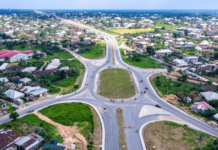The Niger Delta Development Commission (NDDC) has put forth a comprehensive budget proposal amounting to N1.911 trillion for the 2024 fiscal year. This announcement was made by the Managing Director of the Commission, Samuel Ogbuku, during the budget presentation session held on Monday before the Senate Committee on NDDC. The budget, aptly titled the ‘Budget of Renewed Hope Agenda,’ was scrutinized by the committee chaired by Senator Asuquo Ekpenyong.
Mr. Ogbuku highlighted that the proposed revenue carried forward is set at N12 billion, while the arrears owed by the Federal Government and recoveries by Federal Government agencies total N170 billion. This substantial sum forms a significant portion of the financial backbone supporting the ambitious plans laid out by the NDDC for the upcoming year.
A more detailed breakdown of the budget reveals that legacy projects, which are funded through borrowings, constitute a massive N1 trillion of the proposed expenditure. This significant investment underscores the Commission’s commitment to addressing long-standing developmental challenges in the Niger Delta region. Additionally, the Federal Government is slated to contribute N324.8 billion, while contributions from the Ecological Fund are pegged at N25 billion. Oil companies, integral stakeholders in the region, are expected to contribute N375 billion to the NDDC’s 2024 budget.
Ogbuku elaborated on the Commission’s focus on infrastructure development, highlighting key initiatives such as the ‘Operation Light Up Niger Delta Region.’ This project aims to significantly improve the region’s electricity infrastructure, which is crucial for boosting economic activities and improving the quality of life for residents. Another critical project is the construction of multipurpose emergency shelters. These shelters, with a capacity to accommodate 1,000 individuals, are designed to serve as refuges during flood emergencies, addressing the recurring challenge of flooding in the Niger Delta.
In his remarks, Senator Asuquo Ekpenyong, Chairman of the Senate Committee on NDDC, emphasized the importance of timely budget submissions. He warned against the late submission of the NDDC’s budget, noting that the Commission must ensure that its 2025 budget is transmitted early enough to align with the January to December budget cycle. This alignment is essential for maintaining fiscal discipline and ensuring that the Commission’s projects are implemented within the stipulated timeframe.
Senator Ekpenyong also stressed the need for the 2024 budget to build upon existing projects. The goal is to ensure continuity and consolidation of developmental efforts in the region. He highlighted that the efficient use of allocated funds and the completion of ongoing projects are vital for sustaining the momentum of development in the Niger Delta.

The proposed NDDC budget reflects a comprehensive approach to tackling the developmental challenges in the Niger Delta. By focusing on significant infrastructure projects and ensuring timely financial planning, the Commission aims to foster sustainable development in the region. The emphasis on substantial contributions from various sources, including the Federal Government, the Ecological Fund, and oil companies, underscores a collaborative approach to addressing the region’s needs.
The Senate Committee’s scrutiny of the budget proposal and the emphasis on timely submission and consolidation of projects indicate a rigorous oversight process aimed at ensuring accountability and efficiency in the utilization of funds. As the NDDC moves forward with its ‘Budget of Renewed Hope Agenda,’ the successful implementation of these plans will be crucial for driving progress and improving the living conditions of the people in the Niger Delta.
In conclusion, the NDDC’s 2024 budget proposal is a bold step towards addressing the long-standing infrastructural and developmental issues in the Niger Delta. With substantial financial commitments and a clear focus on critical projects, the Commission is poised to make significant strides in improving the region’s socio-economic landscape. The collaborative efforts and stringent oversight from the Senate Committee will be essential in ensuring that the proposed plans translate into tangible benefits for the people of the Niger Delta.




